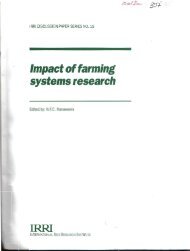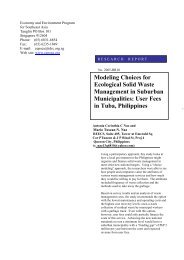Exotic Aquatic Organisms - International Development Research ...
Exotic Aquatic Organisms - International Development Research ...
Exotic Aquatic Organisms - International Development Research ...
You also want an ePaper? Increase the reach of your titles
YUMPU automatically turns print PDFs into web optimized ePapers that Google loves.
86<br />
Discussion and Recommendations<br />
Experiences in the past have revealed that many aquatic species have been introduced into<br />
the Philippines from other countries either through government efforts or through efforts of<br />
private individuals, with or without the concurrence of the Government. Such introductions of<br />
exotic aquatic species, mostly fishes and invertebrates, proved beneficial to food production<br />
efforts of the Government but in some instances resulted in adverse environmental impacts; the<br />
introduced species becoming pests to other crops, new diseases being introduced, with exotic<br />
species, and indigenous species being completely dominated or displaced. It also seems apparent<br />
from the past that the Government has failed to control and study the negative effects that such<br />
introductions would entail, with accidental releases in natural waters taking place. Fortunately,<br />
epidemics caused by parasites and diseases accompanying introductions have not yet taken<br />
place.<br />
Despite many undesirable turns of events from exotic aquatic introductions, adoption of<br />
strict government policies on importation of exotic species has been paid only lip service during<br />
meetings and workshops.<br />
In view of the above, it is recommended that the Government adopts and implements<br />
policies, or even enact laws, that will strictly prevent the ill effects of introduction of exotic<br />
species into the country. Priority consideration should be given to indigenous and endemic<br />
species for utilization to increase fish production in natural waters and in aquaculture before<br />
considering exotic species for such purposes.<br />
It is proposed that the following be considered as guidelines in the importation of exotic<br />
aquatic species into the country:<br />
A thorough study of utilizing indigenous/endemic species be made Ibr whatever<br />
purposes/objectives have been planned before any decision to introduce an exotic<br />
species is made.<br />
If and when a decision to import an exotic species is made, a thorough study of its<br />
biology, results of introduction in other countries, and the effects of such introduction<br />
on local species and the environment should be undertaken before actual importation is<br />
made.<br />
ImportatiOn of the exotic species from a very reliable source, preferably from a research<br />
organization where diseases have been controlled and the genetic constitution of the<br />
species is guaranteed, should be ensured.<br />
On arrival of the imported species, strict quarantine measures should be undertaken.<br />
It is desirable that no organisms are released into natural waters or to private individuals<br />
until the F1 generation or F2 generation has been produced, and which has been given a<br />
clean bill of health by pathologists.<br />
Introduction of exotic species in natural waters should be properly monitored and done<br />
gradually in one or two areas before any introductions into major natural waters are<br />
made.

















